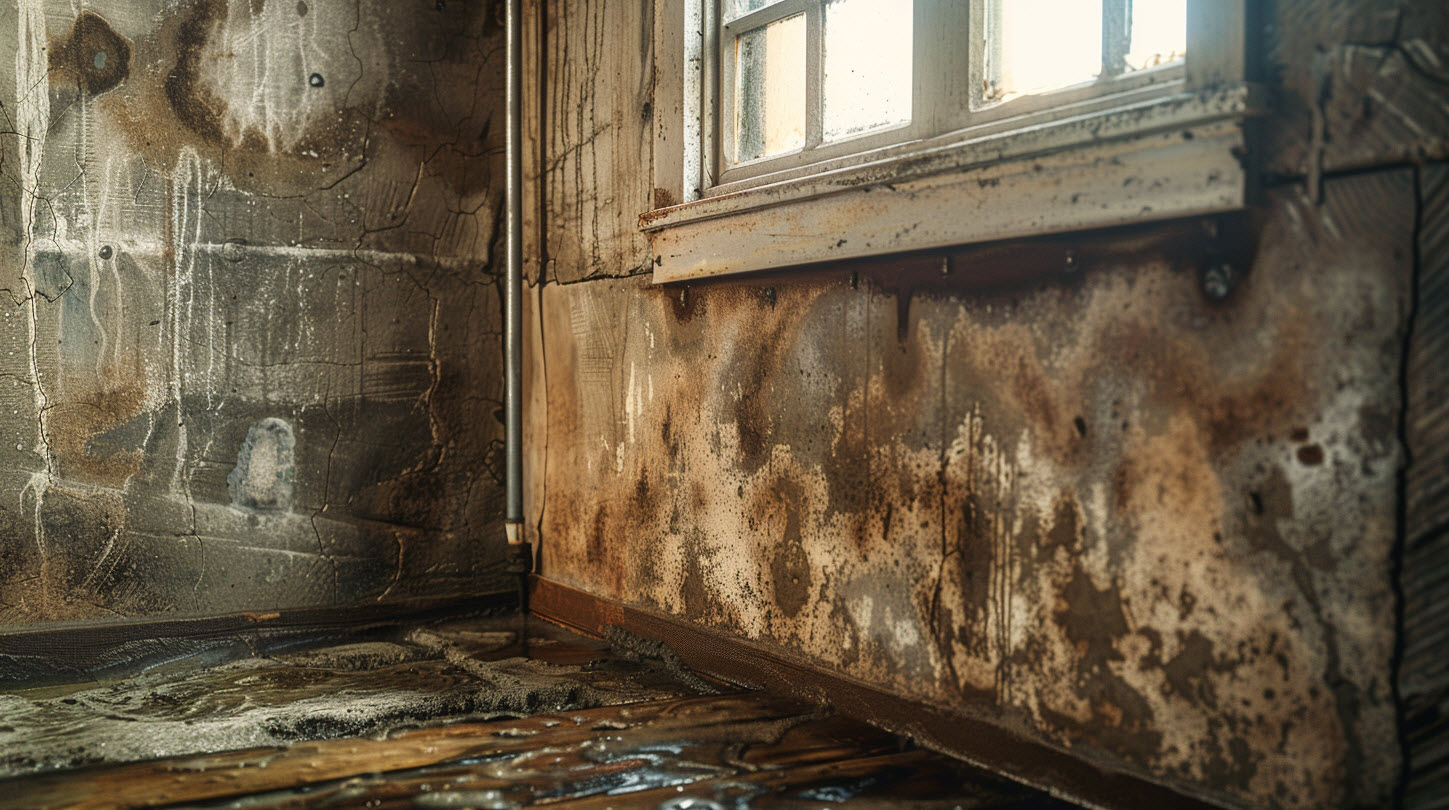5 Best Basement Moisture Solutions in Colorado Springs

In Colorado Springs, you’re likely well aware of basement moisture’s challenges, from structural damage to mold growth. Tackling this issue effectively requires a multifaceted approach. Start by identifying where moisture is seeping into your space—could it be from groundwater, external leaks, or condensation issues? Once pinpointed, solutions like a robust Zoeller sump pump or a precise BasementGutter system can be game changers. But that’s just the beginning. How can vapor barriers or a high-efficiency SaniDry Sedona dehumidifier make a significant difference in maintaining the health of your basement? Let’s explore which solutions best fit your needs and why skipping any could leave your space vulnerable.
Identifying Moisture Sources
To effectively combat basement moisture in Colorado Springs, you must first pinpoint the specific sources of water intrusion. Identifying moisture sources is the foundational step in any thorough basement waterproofing strategy. Common culprits include leaks from water heaters, cove seepage from where the wall meets the floor, wet walls, efflorescence—a white powdery residue that signals water seepage—and general wetness on floors.
Start by inspecting your water heater for any signs of leakage. Even minor drips can escalate into more significant problems under the right conditions. Next, examine the coves and walls for dampness or water trails. Efflorescence is a clear indicator of moisture ingress and shouldn’t be ignored, as it can deteriorate your basement walls over time.
Wet floors can be symptomatic of direct leaks or rising dampness from Colorado Springs’ bentonite clay soil, which is known to expand and contract, exacerbating water penetration issues. This soil characteristic underscores the importance of tailored waterproofing solutions that address the unique challenges posed by local geology.
Sump Pump Installation
After identifying the sources of moisture in your basement, installing a sump pump is the next step to guarantee it stays dry and protected. Opting for a high-quality sump pump, particularly a Zoeller sump pump, ensures reliable and efficient water management. These pumps are celebrated for their robust, cast-iron construction and quiet operation, making them an excellent choice for residential use.
Zoeller sump pumps come equipped with the WaterWatch Alarm, a critical feature that alerts you to high water levels. This early warning system allows you to take timely action before potential flooding occurs. Considering Colorado Springs’ variable weather, a battery-powered backup is advisable. This ensures your sump pump remains operational even during a power outage, providing continuous protection against water intrusion.
Key benefits of installing a Zoeller sump pump include:
- Reliable Performance: Durable cast-iron construction ensures long-lasting operation.
- Quiet Operation: Minimizes noise, avoiding any significant disturbance within your home.
- WaterWatch Alarm: Alerts you to high water levels in the sump pit.
- Battery Backup: Offers protection during power outages, ensuring continuous operation.
- Efficient Water Management: Effectively channels water away from your basement, keeping it dry and damage-free.
These features collectively provide a robust solution to basement moisture problems in Colorado Springs.
Vapor Barrier Application
Installing vapor barriers in your basement is essential to effectively prevent moisture intrusion and protect your home’s structural integrity. These barriers, typically made from durable plastic or foil, are critical for basement waterproofing solutions, particularly in areas like Colorado Springs, where moisture levels can be high.
When considering vapor barriers, it’s essential to understand their role in moisture prevention. By creating a robust, impermeable layer, these barriers keep moisture from seeping into your basement. This is essential for preventing the structural damage associated with water infiltration and reducing humidity levels that can lead to mold growth.
Proper installation of vapor barriers is key to ensuring maximum effectiveness. The material should cover all exposed surfaces, with special attention to joints and edges, which should be sealed meticulously to prevent moisture leakage. This process helps maintain a dry basement environment, greatly improving indoor air quality and contributing to a healthier living space.
Interior Drainage Systems
Understanding interior drainage systems like BasementGutter can significantly enhance your basement’s resistance to moisture issues. These systems are designed to manage the unique challenges of water intrusion in your basement, ensuring a dry and safe environment beneath your home.
When considering BasementGutter, recognizing its advantages is crucial:
- Customizability: BasementGutter systems are tailored to fit your basement’s specific layout and needs, providing targeted moisture control.
- Reduced Mold Risk: By effectively channeling water away, these systems minimize the conditions that allow mold to thrive.
- Structural Protection: Keeping your basement dry helps prevent long-term damage compromising your home’s structural integrity.
- Longevity: With professional installation, BasementGutter is a durable solution designed to handle moisture for years.
- Effective Water Management: Its design explicitly addresses the common pathways through which water enters a basement, offering a robust defense against potential flooding.
Dehumidifier Setup
While interior drainage systems like BasementGutter significantly mitigate moisture, pairing them with a robust dehumidifier setup further enhances your basement’s defense against humidity and mold. You’ll want to consider the SaniDry Sedona basement dehumidifier, which is renowned for its efficiency in maintaining ideal humidity control. This unit isn’t just about pulling moisture from the air; it’s designed to automatically drain it away, so you don’t have to worry about emptying buckets or manual labor.
The energy-efficient design means it won’t spike your electricity bills while it filters mold spores and pollutants, ensuring the air in your basement remains healthy. Poor air quality can trigger allergies and other health issues. With automatic controls, the SaniDry Sedona keeps the humidity levels ideal without you constantly monitoring them. This feature is vital in preventing mold growth, a common concern in basements.
Frequently Asked Questions
Which Basement Waterproofing System Is Best?
The best basement waterproofing system depends on several factors, including installation challenges, system durability, and warranty options.
You’ll want a system that can withstand your area’s specific environmental pressures. Opt for a thorough solution that includes an interior drain system, a robust sump pump, a vapor barrier, and a dehumidifier.
Make sure experienced professionals handle the installation, and it comes with a solid warranty for peace of mind.
What Is the Most Cost-Effective Way to Waterproof a Basement?
Consider a thorough cost analysis of drainage options and moisture barriers to waterproof your basement cost-effectively. Interior sealants and coatings are your most affordable choice, usually around $2-$6 per square foot.
Suppose you’re dealing with more severe moisture; installing a sump pump or a French drain system, though costlier upfront, might offer better long-term protection. These methods balance initial investment against lasting effectiveness, ensuring you choose the best solution for your budget and needs.
What Is the Best Product to Waterproof a Basement?
To waterproof your basement effectively, consider a system that combines an interior drain, such as BasementGutter, with a high-quality sump pump and a wall vapor barrier, like AquaStop WallSeal. These products are durable, tailored to installation challenges, and require minimal maintenance.
Integrating a dehumidifier will enhance air quality and further protect against moisture. This holistic approach addresses both immediate and long-term waterproofing needs.
How Do I Moisture Proof My Basement?
To moisture-proof your basement, apply high-quality sealant options to block external moisture.
Improve your drainage by installing French drains or adjusting your landscape slope.
Additionally, consider upgrading ventilation techniques by adding dehumidifiers and ensuring proper air circulation.
These steps will effectively manage humidity levels, prevent mold growth, and safeguard your basement against water damage, ultimately maintaining the structural integrity of your home.
Conclusion
To effectively combat basement moisture in Colorado Springs, start by pinpointing the sources of moisture.
Install a robust Zoeller sump pump with a WaterWatch Alarm to manage water levels during outages.
Apply a vapor barrier to prevent moisture entry and reduce mold risks.
Implement an interior drainage system like BasementGutter for targeted moisture control.
Lastly, set up a SaniDry Sedona dehumidifier to maintain ideal humidity, ensuring your basement remains dry, healthy, and comfortable.
READY TO START?
Get A Free Quote Today!
Click on the button below and get a free quote!
